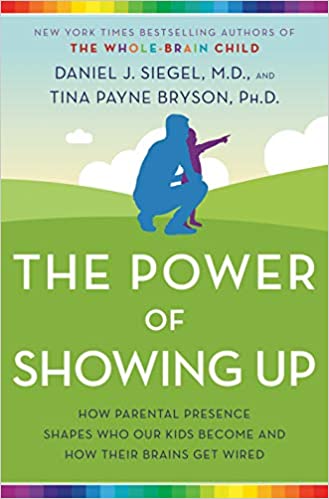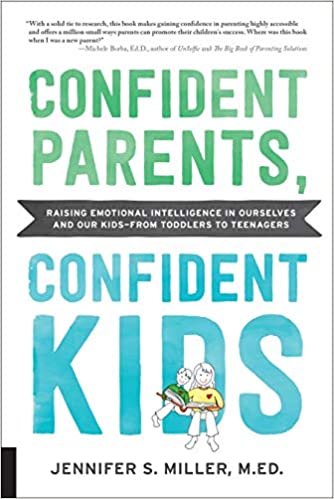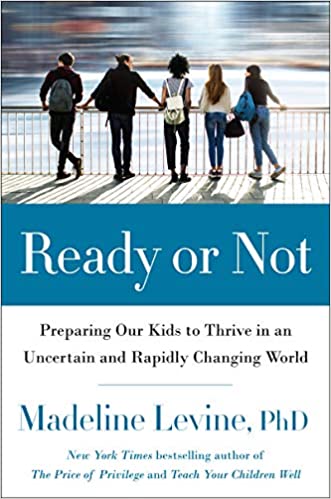Three favorite 2020 books on parenting and mental health
For a lot of families, parenting has never been harder than it was this year. Many have been struggling for months trying to provide child care and schooling at home while simultaneously working either alongside their children or as essential workers in the community, if they haven’t already lost their jobs.
The theme that emerges across our favorite parenting books of the year is how important connection and communication are. These 2020 books offer science-based practical tips and sample scripts to help you communicate better with your children, build closer relationships, and set them up for happiness and resilience in life.
The Power of Showing Up: How Parental Presence Shapes Who Our Kids Become and How Their Brains Get Wired, by Daniel Siegel and Tina Payne Bryson
 “What’s the single most important thing I can do for my kids to help them succeed and feel at home in the world?,” ask Daniel Siegel and Tina Payne Bryson in The Power of Showing Up. Their answer: Show up for them and be physically, mentally, and emotionally present.
“What’s the single most important thing I can do for my kids to help them succeed and feel at home in the world?,” ask Daniel Siegel and Tina Payne Bryson in The Power of Showing Up. Their answer: Show up for them and be physically, mentally, and emotionally present.
This is not always easy, they acknowledge—especially during a time when work and family responsibilities are both happening at home for many parents. But focusing on this one task can help you alleviate the constant worry about doing the right thing and let go of parental perfectionism.
The goal of showing up is to nurture a secure attachment—a strong bond that’s forged by parents being sensitive, responsive, and reliable to children’s needs. With this predictable and warm reference point for what a relationship is, children feel more confident in understanding the world and are better prepared to explore it, rather than feeling stressed because the world seems so unpredictable.
The Power of Showing Up summarizes the host of benefits that a secure attachment brings to children, including stronger relationships with parents, friends, and romantic partners; better coping skills; higher self-esteem; stronger leadership skills; and better academic performance.
Siegel and Bryson break down how to show up into four Ss: feeling safe, seen, soothed, and secure. What strategies can parents use to provide the four Ss to their kids?
To help kids feel safe, pledge not to be a source of fear at home, make amends to repair ruptures in your relationship, and nurture a feeling that home is a haven. Help kids feel seen by being curious about them rather than making assumptions or judgments, and have conversations so that you can enter their world. To help them feel soothed, parents can offer affection and show kids how to use calming strategies when they’re upset. Feeling secure comes from all of the above, as well as helping kids learn that they have inherent worth and the capacity to offer themselves safety and soothing.
Confident Parents, Confident Kids: Raising Emotional Intelligence in Ourselves and Our Kids—from Toddlers to Teenagers, by Jennifer Miller
 In Confident Parents, Confident Kids, Jennifer Miller busts myths that many parents have about confidence, a quality that most of us want our kids to gain. According to Miller, it’s not about being an extrovert, gaining power at all costs, having a high IQ, getting straight As in school, or repressing our feelings. Confidence—feeling sure of your own abilities—comes down to emotional competence.
In Confident Parents, Confident Kids, Jennifer Miller busts myths that many parents have about confidence, a quality that most of us want our kids to gain. According to Miller, it’s not about being an extrovert, gaining power at all costs, having a high IQ, getting straight As in school, or repressing our feelings. Confidence—feeling sure of your own abilities—comes down to emotional competence.
To teach that emotional competence, Miller has worked to support parents, educators, and kids with social and emotional learning for over 25 years. There are five keys to help our kids develop these important skills: modeling (sharing how you deal with big feelings), coaching (guiding kids to find their own solutions), practicing (identifying opportunities to try new skills), creating positive learning environments (nurturing emotionally safe spaces), and appreciating (celebrating small steps).
Miller shares insights to help parents understand kids during different life stages, from birth to the teenage years. For example, preschoolers and early school-aged children experience many transitions in their lives—including daily travel from home to school to after-care and back home, with different rules and relationships with adults in each setting—at a time when they are still developing the skills to think flexibly across settings. These transitions can elicit lots of big feelings. She provides age-appropriate tips for parents to help cultivate children’s self-control and self-management skills, like making rules about screens, practicing deep breathing, creating a safe base to go to when they have big feelings, and reflecting together about anger using children’s books.
Miller sprinkles parenting scenarios into her book that bring to life how research-based, practical strategies can be used in everyday moments with our kids. “In a practical way, children raise parents,” she explains. “As we become more reflective about our own beliefs and educated about development—our children’s and our own—we gain enough mastery to resonate, to improvise, and to build up an increasingly complex, delicious sound that offers us deep joy, satisfaction, and meaning beyond our wildest imaginings.”
Ready or Not: Preparing Our Kids to Thrive in an Uncertain and Rapidly Changing World, by Madeline Levine
 “Anxiety is now the number-one mental health disorder for both adults and children,” writes psychologist Madeline Levine. “Ready or Not is about addressing that anxiety. It is about the damage unchecked anxiety does to parents’ decision-making at the very moment we need greater, not lesser, clarity about everything from which preschool will best nourish our toddler to which university will be the best fit for our high-school senior.”
“Anxiety is now the number-one mental health disorder for both adults and children,” writes psychologist Madeline Levine. “Ready or Not is about addressing that anxiety. It is about the damage unchecked anxiety does to parents’ decision-making at the very moment we need greater, not lesser, clarity about everything from which preschool will best nourish our toddler to which university will be the best fit for our high-school senior.”
The consequences of parent and child anxiety are evident in five main areas, Levine writes. Parents’ unreasonable expectations can put a tremendous amount of pressure on kids and constrict the space they need for deep learning, leading to unhealthy overachieving. A false self emerges in kids who are dependent on others’ approval (especially on social media) rather than engaged in self-reflection to understand who they really are and want to be. Many kids are suffering from social isolation, leading to fewer opportunities to cultivate critical interpersonal skills. Parents micromanaging and providing excessive oversight can deprive kids of the experience of recovering from challenges or failure and make them feel powerless. And the shaky sense of morality that many kids have orients them toward materialism, unethical rule-bending, and cheating.
How can parents help their children overcome these challenges and cultivate resilience and love of learning? Levine suggests nurturing proficiencies and skills like digital literacy, data analysis, critical thinking, curiosity, creativity, flexibility, educated risk-taking, collaboration, perseverance, and self-regulation.
“Of all the qualities parents can cultivate in their children, hope and optimism are the most precious,” says Levine. “We can nurture hope and optimism in our kids by demonstrating that we always have some control over our environment and ourselves. The future isn’t a tide that’s going to crush us, it’s a wave we’re a part of.”
 Maryam Abdullah, Ph.D., is the Parenting Program Director of the Greater Good Science Center. Jill Suttie, Psy.D., is Greater Good’s former book review editor and now serves as a staff writer and contributing editor for the magazine. Diana Divecha, Ph.D., is a developmental psychologist, an assistant clinical professor at the Yale Child Study Center and Yale Center for Emotional Intelligence, and on the advisory board of the Greater Good Science Center. Based at UC-Berkeley, Greater Good highlights ground breaking scientific research into the roots of compassion and altruism. Copyright Greater Good.
Maryam Abdullah, Ph.D., is the Parenting Program Director of the Greater Good Science Center. Jill Suttie, Psy.D., is Greater Good’s former book review editor and now serves as a staff writer and contributing editor for the magazine. Diana Divecha, Ph.D., is a developmental psychologist, an assistant clinical professor at the Yale Child Study Center and Yale Center for Emotional Intelligence, and on the advisory board of the Greater Good Science Center. Based at UC-Berkeley, Greater Good highlights ground breaking scientific research into the roots of compassion and altruism. Copyright Greater Good.


